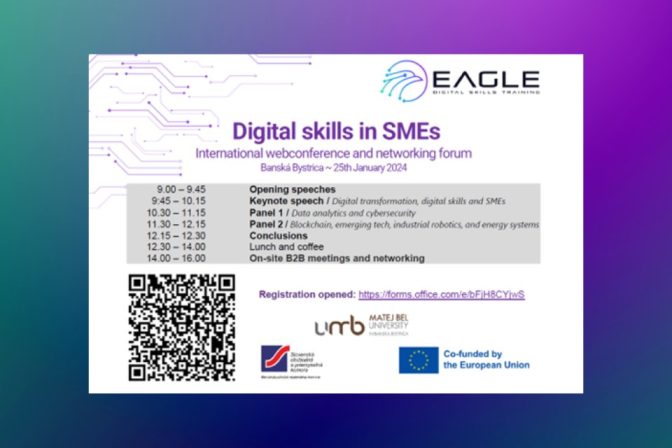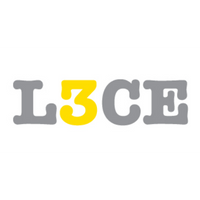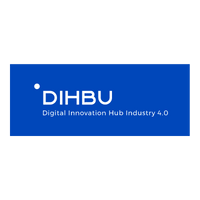Welcome to
Project EAGLE Platform
Covering the training gap in digital skills for European SMEs manpower.

About the project
Context
SMEs are increasingly aware that digitization is the key for being more competitive and for achieving higher business development. Based on a Eurostat survey, one of the principal barriers that European SMEs are facing is the lack of relevant qualifications and experience of potential candidates.
The need for Information and Communication Technologies (ICT) skills is also highlighted in a report2 by the Learning and Knowledge Development Facility (LKDF) of the United Nations Industrial Development Organization (UNIDO) and the European Training Foundation (ETF). As shown in the report, 76.2% of 105 companies surveyed felt that their need for improvement is mainly in ICT skills.
According to a different global survey of enterprises, 70% of large enterprises actively provided the training, while only 23% of SMEs did so. As SMEs are the backbone of the economy and digital skills are increasingly connected to how business is conducted, it is important to facilitate both the teaching and learning of digital skills among SMEs. As it is shown in the report “ICT workforce in Europe and its gender challenge after Covid-19”, currently in Europe less than one in five ICT specialist job is occupied by a woman, and ICT programmes in formal education systems can act as the primary pathway towards ICT jobs and face equally big gender gap.
Mission
The project EAGLE aims to contribute to development of vibrant European education communities, capable of working with business partners to identify existing skill/knowledge gaps and able to fill them.
Objectives
- To provide access to high-level educative contents regarding digitalization and new technologies, specifically to SMEs managers and staff, as well as job-seekers; contributing to bridge the digital divide between large, multinational companies and the rest of society.
- To increase the number of professionals able to design, develop and deploy digital solutions in the economy and across sectors.
- To strengthen the relationship between private companies, especially SMEs; and Higher Education Institutions, by analysing the knowledge needs of the first and providing specialized education adapted to their requirements, both in the contents, in the methodology for their delivery (short-courses, on-line or blended learning, etc.) and the academic certification provided (micro-credentials).
- To contribute to digital transformation of businesses (framed in BUSINESS as one of the cardinal points of the Europe´s Digital Decade: Digital decade for 2030), contributing to the EUʼs digital ambitions for 2030 through concrete terms in regard to innovators, Late adopters, and Tech-up take.
- To contribute to gender convergence, relative to digital skills of people in the labour force (framed in SKILLS as one of the cardinal points of the Europe´s Digital Decade: Digital decade for 2030), contributing to the EUʼs digital ambitions for 2030 through concrete terms.
- To strengthen the links between HEIs from different regions in the EU by cooperating in the design of the planed crash courses and therefore, acquiring a deeper understanding of the particular circumstances and the economic and productive environment of each partner.
Approach
Project EAGLE leverages already made investments by project partners. Already existing training programs of EAGLE partners will be used as a basis for development of crash courses, incorporating existing experience and feedback, adjusting them to the aims of the project, improving content, methodology of presentation, etc.
This approval allows to develop training courses with ambitious timeline and higher quality.
The EAGLE project will consider the EU digital platform for skills and jobs as its capital tool for the course’s promotion, being the basis for the Communication and Dissemination project and courses strategy.
The project will aim to establish sustainable links of SME’s organizations and HEI, as well between HEI themselves.
Impact
In the short term, the project will:
- Provide reskilling/upskilling opportunities to individuals and employees of SMEs
- Improve the quality and foster innovation in training, responding to the needs of the SMEs in terms of digital skills.
- Provide European business associations and HEIs with opportunities for developing new partnerships; They will offer full access to their institutions including all technical facilities and support units putting into action a shared academic endeavour.
In the medium and long term, the project, once put into action the courses programme, will impact:
At systemic and societal level
- Remove barriers to learning, improving access to high quality and innovation-driven training.
- Respond to societal and labour market needs.
- Contribute to the development of innovative training policies.
- Improve our capacity of response for our pressing societal problems though the attraction and training of highly qualified professionals, able to take on the industry/business digitalization and modernization challenge, but also conscious with current problems.
- Increase the synergies between higher education, innovation and research.
- Foster academic cooperation within the EHEA and beyond by supporting joint teaching and qualifications.
At institutional level
- Provide European HEIs with more opportunities for structured and sustainable academic cooperation.
- Improve the quality of training programmes.
- Increase the internationalisation and competitiveness of participating organisations.
- Support the creation of new networks and enhance the quality of existing ones.
- Increase the attractiveness of the participating organisation(s) towards talented students.
At individual level
- Improve the employability of courses participants.
- Acquire advanced digital skills and competences related to digital technologies and how they can be deployed to innovate and expand their businesses.
- Enhance networking and communication capacities of the participants.
- Increase the individual contribution to a knowledge-based and sustainable economy and society.
Project program
Explore planned courses





Get involved
Sign up!





















